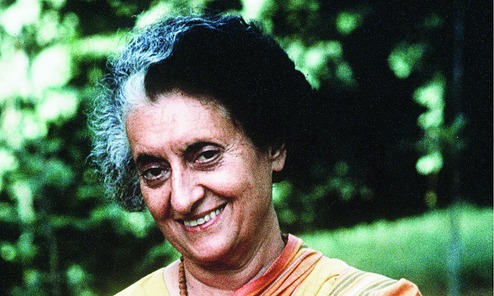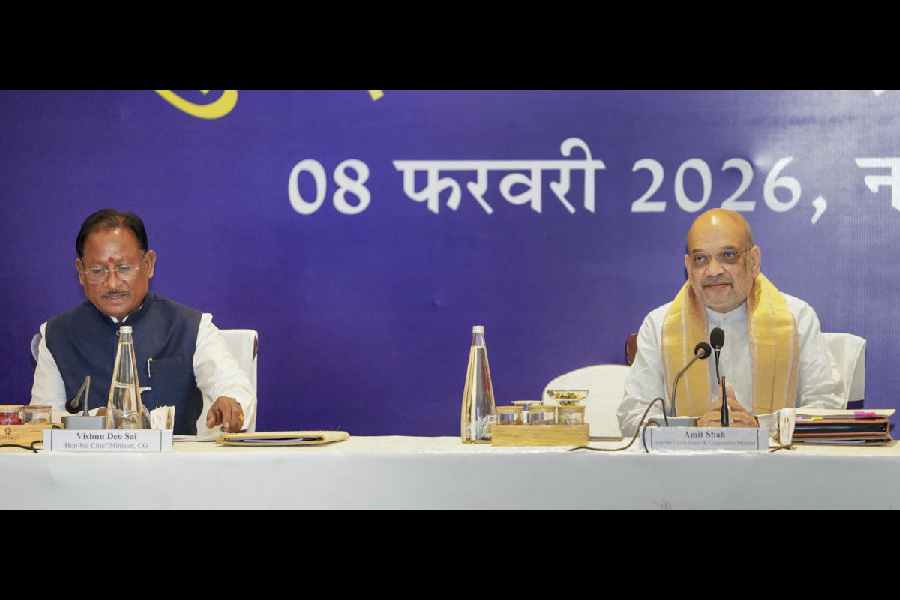
We live in strange times. Our public discourse - steered by the ruling Bharatiya Janata Party regime and its assortment of vituperative fellow travellers - can be dominated by the brouhaha over a yet-to-be released Bollywood film about a medieval Rajput queen whose provenance lies in legend and myth. And it can completely ignore a towering personality who lived and died in our midst, a real flesh and blood human being - whose life is more fascinating, who cast a more profound influence on our times than any fictional heroine in celluloid or poetry.
It is hardly a secret that the Narendra Modi government at the Centre and the BJP-ruled governments in the states act as the executive arms of the Rashtriya Swayamsevak Sangh's ideological project to refashion India's past and future. An intrinsic part of this project is to manufacture a new pantheon of "heroes" despite their meagre contribution to the making of India, and minimize the role of those who fought for India's freedom and were instrumental in building the post-Independence nation.
But special occasions call for special gestures and November 19 was a special day indeed. Yet in an extraordinary display of mean-mindedness, the government of the day chose to ignore the 100th birth anniversary of Indira Gandhi. Barring a perfunctory tweet by the prime minister, there was no advertisement issued in her memory, no commemoration of her life, no discussion on her contributions - for better and for worse - in her long innings at the helm of the country.
What is significant, though, is that the official neglect of such an important milestone evoked little comment even from critics of the RSS-BJP regime because Indira Gandhi remains a deeply controversial leader for many. Unlike her father, she possessed an extremely complex personality - evoking both intense hatred and abundant love from the time she first took over as prime minister in 1966. Her legacy, too, is sharply chequered, which makes even Congress members cautious in propagating it wholeheartedly.
Yet, it is this very complexity that makes Indira Gandhi so much more interesting than so many other figures from our history. Her flaws, to be sure, were many. Reams have been written on her authoritarian streak, her dismantling of inner party democracy in the once robust Congress, her undermining of public institutions and her biggest folly - the declaration of Emergency. She is also pilloried for anointing one son after another as her political heir and converting the Grand Old Party into a family firm, thus making dynastic succession the accepted norm in almost every other political party.
Whether these flaws emanated from personal frailties or circumstances thrust upon her (or a bit of both) remains unclear to this day. She has been vilified for dismantling the Congress apparatus and reaching out directly to the people but it is also true that the Congress old guard had their knives out for her from the very start, not expecting the "dumb doll" to fight back so ferociously. The 'what ifs' of history is an idle pursuit but it is fair to speculate that if Morarji Desai had become prime minister in 1966 or the Syndicate had won in 1969, the Congress would have more quickly abandoned its socialist and secular moorings, and the RSS would have captured the Indian State many decades before it eventually did.
The relentless focus on Indira Gandhi's faults has to a large extent overshadowed her profound contributions to the nation on the one hand and the huge price she paid for every transgression she committed.
Even her most vociferous critics concede that her biggest achievement was leading India to victory in the 1971 war - the only decisive win the country has secured on the battlefield. But her peacetime achievements were formidable too. In a recent article, the economist, Yoginder K. Alagh, recalled his meeting with Indira Gandhi after taking over as head of the Perspective Planning Division of the Planning Commission in 1974 and how she underlined the crying need for food self-sufficiency. "Indira Gandhi," he noted, "made India stand on its feet and stop begging for grain. Malnutrition is still there. But you don't beg for grain, thanks to her."
India's strides in space research and nuclear technology also got a big fillip under her stewardship and her love for nature and wildlife ensured that India - in spite of its poverty and massive population - can today boast of a larger number of sanctuaries and national parks than many a prosperous nation.
But more than all these concrete achievements, it is Indira Gandhi's courage that remains her standout characteristic. Her reputation as an autocratic leader with matchless charisma who mesmerized the masses has made many people - serious historians and laymen alike - compare Narendra Modi to Indira Gandhi. Superficial similarities notwithstanding, the comparison is grossly facile.
Indira Gandhi's courage in dealing with adversity was authentic to the core and, for the most part, she fought her battles single-handedly. Modi, on the other hand, has the full RSS machinery propping him up and has the crafted synthetic appeal that comes from good event management skills.
Like Indira Gandhi, Modi too has started indulging in pro-poor rhetoric. But if she took on the 'captains of industry' and disliked and was disliked in turn by the well-heeled, Modi's primary champions were - and continue to be - corporate honchos and sundry social Darwinists.
Both are accused of being impatient with democracy, with today's climate of fear and intimidation often likened to an "undeclared emergency". But while the imposition of Emergency was among the darkest chapters in free India's history, it is often forgotten that Indira Gandhi herself decided to call for elections and end the aberration, not make it the norm. In her broadcast to the nation on January 18, 1977, she said, "Every election is an act of faith. It is an opportunity to cleanse public life of confusion. So let us go to the polls with the resolve to reaffirm the power of the people."
She faced an ignominious defeat, and faced much abuse and ridicule. But those who inflicted the other big damage on India's fabric - the demolition of the Babri Masjid - have gotten away without paying any price for their crime, then or now.
Another fact that is often forgotten is that in spite of being a ruthless practitioner of realpolitik that entailed using the 'communal card' for electoral gain in the 1980s, Indira Gandhi remained deeply secular at heart. In 1971, when millions of refugees from East Pakistan flooded into India, she never alluded to their religion - so completely at contrast with the vicious campaign against a few thousand Rohingyas today.
But it is her final act of courage and conviction that holds a remarkable lesson for us today. After Operation Bluestar, all intelligence reports stressed that her life was in danger. But when the head of the Intelligence Bureau ordered all her Sikh security guards to be removed from duty, Indira unreservedly vetoed it. She paid with her life but she would not have had it any other way.
According to Katherine Frank's biography, Indira Gandhi had premonitions of her death in the months before her assassination. In a note found among her papers, she wrote: "If I die a violent death as some fear and a few are plotting, I know the violence will be in the thought and the action of the assassin, not in my dying - for no hate is dark enough to overshadow the extent of my love for my people and my country... I cannot understand how anyone can be an Indian and not be proud - the richness and infinite variety of our composite heritage, the magnificence of the people's spirit, equal to any disaster or burden, firm in their faith... even in poverty and hardship."
Finally, it was this deep and abiding faith in India and the Indian people - without a trace of the bigotry-laced bombast of today's hyper nationalists - that gave Indira Gandhi the courage and the energy to battle personal tragedies and political conflicts.
That love was returned in ample measure by the poor and the underprivileged across India. More than three decades after her death, thousands still throng her memorial in Delhi and her name is still recalled with awe in remote corners of this land where media do not reach. Official neglect and scholarly disdain cannot so easily erase her memory...










